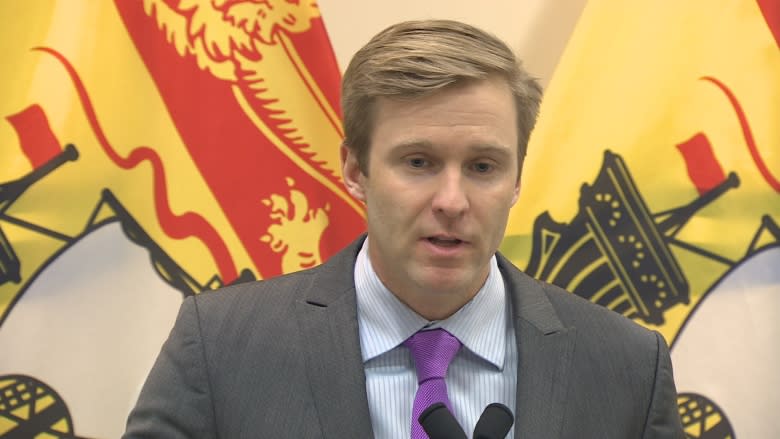Preferential ballot question possible in 2020 referendum
The Gallant government is doubling down on an electoral-reform referendum in 2020 with a promise to let New Brunswickers vote on whether to adopt a preferential ballot in provincial elections.
That'll be on top of a vote on whether to lower the voting age to 16. Both votes would be held the same day as municipal elections in May 2020.
But the twin referendums are still just hypothetical ideas that may never happen if Premier Brian Gallant's Liberal government isn't re-elected in the next election in September 2018.
"I'm not in a position to tell you about the [Liberal election] platform at the moment," Gallant said, but "you have my word and my promise that these will be referendum questions come the 2020 municipal election."
No PC commitment
He said he could "only hope" that other political parties would make the same promise, but the opposition Progressive Conservatives refused to commit to it should they win next year.
"The Official Opposition is concerned that the Gallant government fails to understand a fact central to our democracy: the Gallant Liberals' term in office expires on September 24, 2018, and their ability to dictate policy ends on that date," PC Leader Blaine Higgs said in a written statement.
"Any promises to be enacted after that date are by definition election promises and not government policy, and the Official Opposition will not be responding to campaign promises."
Candidates ranked
Under a preferential ballot, voters could choose to rank their preferred candidates.
In a first round of counting, only first choices would be tallied. If no candidate got more than 50 per cent, the last candidate would be dropped, and the second choices on his or her ballots would be added to the totals of the remaining candidates.
That would continue until a candidate reached 50 per cent.
An independent commission on electoral reform called the idea a "modest and pragmatic" way to let more voters feel their votes influence the final result.
But the PCs say the commission's work was "flawed from the outset" because it did its work "without the participation of any parties other than the Liberals."
At first, the Liberals wanted a committee of MLAs to study electoral reform, but the PCs refused to take part without a promise from the government that any major reforms would be put to a referendum.
The Liberals instead appointed an independent commission of non-MLAs, though they've now ended up doing what the PCs originally demanded: promising referendums on the proposed changes to the voting system.
Green Party Leader David Coon said he was disappointed that proportional representation, another form of balloting, won't be put to a referendum in 2020. The Liberals say they'll ask a future commission on electoral boundaries to study that model. That's what the recent commission recommended.
The New Democratic Party also would have preferred pursuing a system of proportional representation, where parties would be given representation in the legislature that was somewhat in line with their popular support.
"Tacking 'preferential ballots' onto our current voting system doesn't solve any of the systemic problems we have, it exacerbates them," interim NDP leader Rosaire L'Italien said in a statement.
"This is no better than our current system, and is actually even worse in many respects," he said, indicating that such a system leads to strategic voting that would disproportionately favour the Liberals.
Referendum law changes possible
The province's existing referendum law says a result is only binding if a majority of registered voters cast ballots, something unlikely to happen in a municipal election when turnout is often low.
But Gallant said his government will look at changing that. He also said the Liberals will consider imposing spending and donation limits on Yes and No campaigns.
In a 2001 referendum on video gambling machines, no limits existed and the campaign to keep the machines legal outspent opponents by a wide margin and won the vote.
Gallant said avoiding an unfair advantage to those with "deeper pockets" is "something we have to definitely discuss."
Other changes promised
The premier announced or confirmed several other initiatives to respond to the commission's recommendations, including a law that would require political parties to publicly file a costing of their promises during election campaigns.
The PCs passed such a law in 2014 that included penalties for parties after election day, but the Liberals repealed it after winning the election.
The Liberals say their version will be better because it will allow for penalties during the campaign.
The PC statement said the party is skeptical about the Liberals running "any system that would interfere with free and transparent election campaigns."
Other changes Gallant announced Thursday included:
- Changing the fixed-date election law so that elections are held on the third Monday of October every four years, but this would only take effect after next year's election scheduled for Sept. 24.
- Lowering the maximum political donation to a political party from $6,000 to $3,000, with a promise to look at phasing out corporate and union donations after the next election.
- Rejecting electronic voting for now because of security concerns. If those can be addressed, the province would pilot e-voting in a future municipal election.
- Rejecting giving permanent residents the right to vote because the Constitution explicitly says that "citizens" have the right to vote, including in provincial elections.
- Putting the Lobbyists Registration Act into effect April 1 with a public registry online July 1 so that New Brunswickers can see who gets paid to arrange meetings with provincial government officials.




